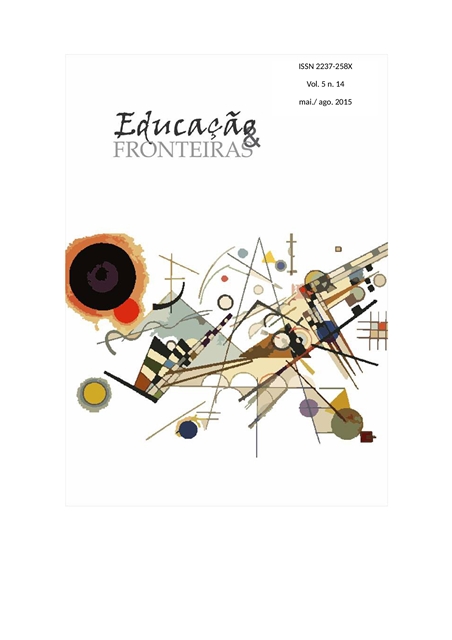Teacher Education, daily life and Special Education
Keywords:
Special Education. Teacher education. Experience.Abstract
This study presents a reflection about teacher education, related to school inclusion, focusing on the processes that enrich the teaching experience as a constitutive part of the formative journey. The research locus involves a specific working group, composed of basic education teachers and researchers related to the Special Education area and to the processes of school inclusion. Starting from an analysis about the possibility of innovation, the following guiding question was settled: what are the possible educational developments arising from the development of an innovative plan of action comprising Universities, basic education schools and specialized educational services? The research encompassed the documentary analysis of minutes that consist the collective trajectory of the group, during the period of a year, and, furthermore, the participant observation in weekly meetings. From these analyses, it is possible to perceive the power associated to this planning of action in a collective manner, in a way that now the group represents a continuous support for these teachers in what concerns the development of the teaching process at schools. Some concepts played a preponderant role during this work, such as innovation, daily life and demands.Downloads
References
BAPTISTA, C. R. Ação pedagógica e educação especial: a sala de recursos como prioridade na oferta de serviços especializados. Revista Brasileira de Educação Especial, Marília, v.17, p.59-76, maio/ago. 2011.
BATESON, G.; BATESON, M. C. El temor de los Angeles. 2.ed. Barcelona: Gedisa, 1994.
BRASIL. Ministério da Educação. Lei n.º 9.394, de 20 de dezembro de 1996. Estabelece as diretrizes e bases da educação nacional. Brasília. Disponível em: http://www.planalto.gov.br/ccivil_03/LEIS/L9394.htm. Acesso em: 1 dez. 2014.
______. Coordenação de Aperfeiçoamento de Pessoal de Nível Superior. Portaria n.º 152, de 30 de outubro de 2012. Regulamenta o programa Observatório da Educação (OBEDUC). Brasília. Disponível
em: https://www.capes.gov.br/images/stories/download/legislacao/Portaria_152_30out12_Regulamento_OBEDUC.pdf. Acesso em: 1 dez. 2014.
______. Ministério da Educação. Instituto Nacional de Estudos e Pesquisas Educacionais Anísio Teixeira – INEP. Censo Escolar da Educação Básica, 2012. Diponível em: http://portal.inep.gov.br/basica-levantamentos-acessar. Acesso em: 1 dez. 2014.
CANEVARO, A. Senza documentatori dove sarebbero gli innovatori. In: COCEVER, E.; CHIANTERA, A. (Org.). Scrivere l’esperienza in educazione. Bologna: CLUEB, 1996.
CUNHA, A. G. da. Dicionário etimológico da língua portuguesa. 4. ed. revisada e atualizada. Rio de Janeiro: Lexikon, 2010.
FERRAÇO, C. E. Pesquisa com o cotidiano. Educação & Sociedade, Campinas, vol. 28, n. 98, p. 73-95, jan./abr. 2007.
IANES, D. L’evoluzionedell’insegante di sostegno: verso una didattica inclusiva. Trento: Erickson, 2014.
IMBERNÓN, F. Formação continuada de professores. Porto Alegre: Artmed, 2010.
JESUS, D. M.; VIEIRA, A. B. Formação de profissionais da educação e inclusão escolar: conexões possíveis. In: MAGALHÃES, Rita de Cássia Barbosa Paiva (Org.). Educação Inclusiva: escolarização, política e formação docente. Brasília: Líber Livro, 2011. p. 135-156.
JESUS, D. M.; BAPTISTA, C. R.; CAIADO, K. (org.). Prática pedagógica na Educação Especial: multiplicidade do atendimento educacional especializado. Araraquara: Junqueira & Marin, 2013.
LARROSA, J.. Notas sobre a experiência e o saber da experiência. Revista Brasileira de Educação, n.19, jan./abr. 2002.
MATURANA, H.; VARELA, F.. A árvore do conhecimento: as bases biológicas da compreensão humana. São Paulo: Palas Athena, 2001.
MEIRIEU, P.. Aprender... sim, mas como? Porto Alegre: Artmed, 1998.
MOSER, A.. Formação docente e comunidades de prática. Revista Intersaberes, n.10, jul./dez. 2010.
SILVA, D. da. De onde vêm as palavras: origens e curiosidades da língua portuguesa. 17. ed. revista e atualizada. Rio de Janeiro: Lexikon, 2014.
TARDIF, M.. Saberes docentes e formação profissional. Petrópolis: Vozes, 2013.
WENGER, E.. Comunidades de práctica: aprendizaje, significado e identidad. Barcelona: Paidos Iberica, 2001.
WENGER, E. A. social theory of learning. In: ILLERIS, Knud. Contemporary theories of learning: learning theoristsin their own Words. New York: Routledge, 2009









